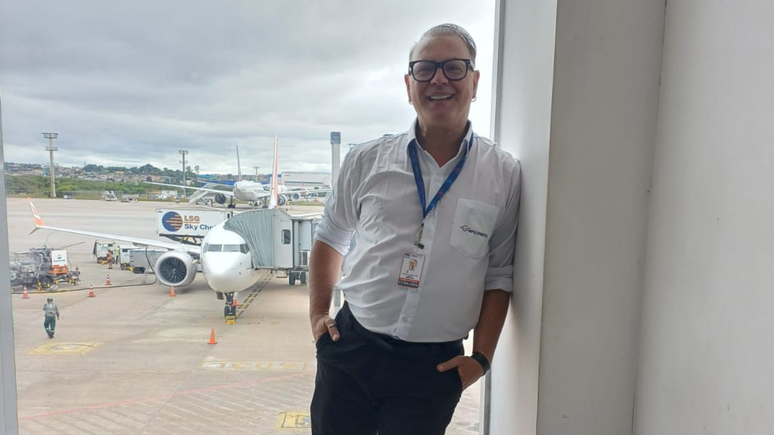In the context of the dispute in the Amazon region, the United States announced military exercises with Guyana.
The crisis surrounding the Essequibo region, disputed by Venezuela and Guyana, seems to have rekindled an old fear common on the right and left in Brazil: the presence of US troops in the middle of the Amazon forest.
The concern gained new momentum this Thursday (07/12) after the US Armed Forces Southern Command announced that it will conduct joint military exercises with the Guyana Defense Force.
In Brazil, President Luiz Inácio Lula da Silva’s (PT) chief international affairs advisor, Ambassador Celso Amorim, said his main fear regarding the escalation of the crisis between Guyana and Venezuela is that it will serve as a pretext for the presence of foreign military personnel in the Amazon.
“What I fear most, to tell the truth, is that precedents will also be created due to the presence of foreign bases and troops in the region. We are not talking about just any region. We are talking about the Amazon, which is always a subject of discussion a lot of concern on our part. This is our biggest concern,” Celso Amorim said in an interview with Canal Meio.
Military exercises involving Americans in the Amazon are nothing new. In November this year, for example, 294 of the country’s military personnel landed in Brazil to train in the Amazon jungle. The difference now is that the Americans will arrive in Guyana in the midst of a geopolitical crisis between the country and Venezuela.
The two countries have been competing for more than a century over Essequibo, an area of over 160,000 km² (slightly larger than the state of Ceará) rich in minerals such as gold and diamonds, as well as oil. Tensions have increased in recent months after Venezuela held a referendum on the creation of a new state in the disputed area. Essequibo corresponds to 70% of the territory of Guyana.
The International Court of Justice (ICJ), provoked by the government of Guyana, issued a ruling establishing that Venezuela cannot take measures to incorporate Essequibo into its territory. Nicolás Maduro’s regime, however, has announced that it does not recognize the legitimacy of the Court to resolve the dispute.
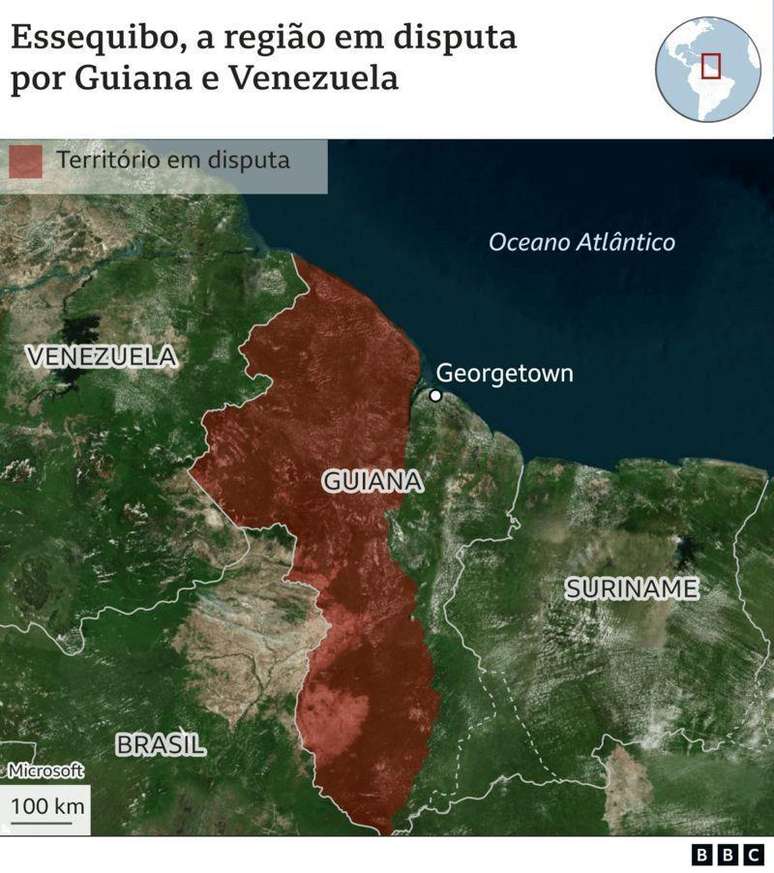
After the referendum, President Nicolás Maduro appointed the governor of the state he intends to create and announced the issuing of licenses for oil exploration on the Essequibo coast.
In response, Guyana’s President, Mohamed Irfaan Ali, requested help from the United Nations (UN) and made contact with US Secretary of State, Antony Blinken, on Wednesday (12/06).
In a statement, the State Department announced that it will provide “unwavering” support for Guyana’s sovereignty. The next day, the United States Southern Command announced that it would conduct exercises in conjunction with Guyanese military personnel. According to the command, the exercises consist of “flying operations” within the territory of Guyana.
In a statement on the matter, the United States Embassy in Guyana said that the Southern Command “will continue its collaboration with the FDG (Guiana Defense Forces) in the areas of disaster preparedness, air and maritime security and combat to transnational criminal organizations” and that “The United States will continue its commitment as Guyana’s trusted security partner.”
The announcement sparked reactions in Venezuela. Defense Minister Vladimir Padrino called the exercises a “provocation”.
“This unfortunate US provocation on behalf of ExxonMobil praetorians in Guyana is another step in the wrong direction. We warn that they will not deter us from our future actions to recover Essequibo. Make no mistake. Long live Venezuela,” he said Godfather in a post on your social networks.
Historical concern
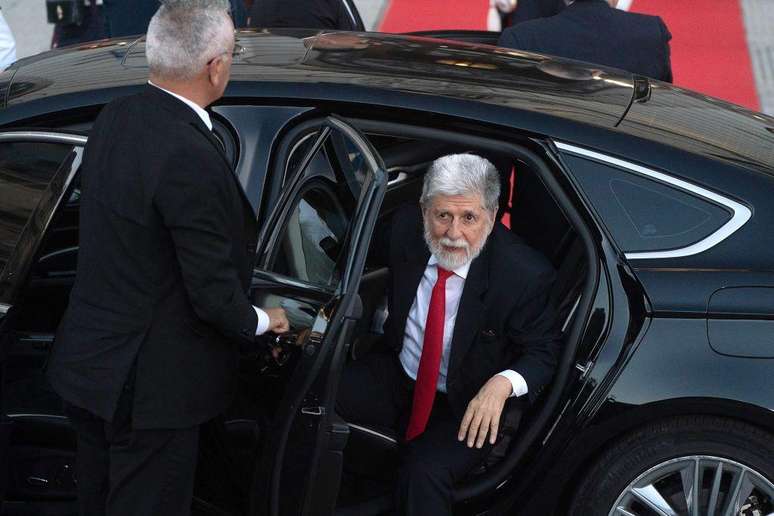
Concern that the Amazon could be the target of foreign troops is long-standing. Starting from the colonization process, Portuguese fortifications were built in various parts of the region to prevent the advance of the invaders.
More recently, this concern has become one of the elements that unites activists on both the Brazilian left and right. The main fear is due to the size of US military power.
According to the Stockholm International Peace Research Institute (Sipri), in 2022, the United States was responsible for the largest military spending in the world, with $877 billion, or 39% of all military spending on the planet.
During the military dictatorship (1964–1985), for example, the fear that the region might be the target of some kind of foreign intervention was used as the main reason for the creation of employment projects in the region between the 1960s and 1980s.
It was also during this period that the Brazilian military strengthened and created military installations at points along the country’s northern border.
The slogan used by the regime at the time was “integrate not to deliver”.
The fear was that alleged international greed for the region could lead to foreign occupation actions. The Amazon is responsible for 45% of all fresh water on the planet, as well as hosting the largest tropical forest on the planet. It is an area rich in biodiversity and precious minerals and metals.
At the time, the military’s concern concerned both a possible occupation of the region by some superpower and the action of groups opposed to the regime, such as the Guerrilha do Araguaia.
Between 1972 and 1974, a group of left-wing militants settled in the interior of Pará with the aim of organizing a rural guerrilla war to overthrow the dictatorship. The group was defeated by Army troops.
At the end of the first decade of the 2000s, sectors of the Brazilian left expressed concern about an agreement signed between the governments of the United States and Colombia, which provided for the installation of seven North American military bases in the South American country.
In 2010 the agreement was deemed unconstitutional by Colombian courts.
For Carol Pedroso, doctor in International Relations and professor at the Federal University of São Paulo (Unifesp), the crisis between Venezuela and Guyana has “resurrected” the fear of the American presence in the Amazon.
“This crisis completely revives the fear that worries Brazil and other countries such as Colombia, which has just concluded its peace processes and which today is governed by a leadership relatively close to Maduro,” the professor told BBC News Brazil in reference to the peace agreements between the Colombian government, led by President Gustavo Petro, and the Revolutionary Armed Forces of Colombia (FARC).
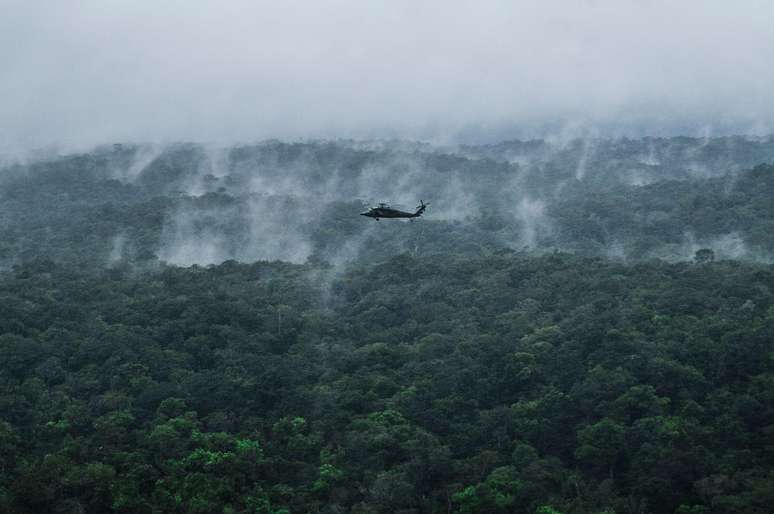
According to Christopher Garmam, director for the Americas of the consultancy Eurasia Group, the Brazilian government views American military actions in South America with suspicion.
“These types of movements worry the Brazilian government, which has made it very clear that it does not see these types of actions as something constructive and sees it as undue interference in the region,” Garmam said.
However, the analyst believes that the exercises announced by the US government on Thursday would not mark a trend.
“This government action tends to be more limited and should not turn into an intervention in South America or the Amazon,” he said.
For Ricardo Seitenfus, retired professor of International Relations and former representative of the Organization of American States (OAS) in Haiti, the arrival of the Americans in the region would have been caused by Brazil’s position regarding Maduro’s actions. According to him, Brazil should have been more forceful in condemning the movements of the Venezuelan regime.
“The deafening silence of the Brazilian government forces Guyana’s allies to act. Now, Washington and soon London will come to protect Guyana’s sovereignty and territorial integrity. This is due to Brazil’s culpable negligence,” Seitenfus told BBC News Brazil.
Leadership under control?
Analysts consulted by BBC News Brasil said that, so far, Brazilian leadership in the region would be unaffected by the Essequibo crisis and the involvement of the Americans.
“It seems that Celso Amorim and other diplomats are trying to use their influence to call for calm. Whether Maduro will listen is another story, but I think the Brazilian government’s opposition [às ações de Maduro] makes a Venezuelan invasion even less likely. Apparently, any invasion would have to go through Brazilian territory and I don’t see any circumstances in which that could happen,” Brazilian and editor-in-chief of Americas Quarterly magazine Brian Winter told BBC News Brasil.
“Evidently, when there are American military exercises in the region, this is inconvenient for Brazil. At the same time, the American position does not diverge from the Brazilian one in the region. Brazil has accelerated military plans in the north of the country in the midst of this crisis This is a strong signal to Venezuela that they will not accept troops crossing the country to invade Guyana,” said Christopher Garmam.
“This episode does not call Brazil’s leadership into question, but it is a great challenge. I would say it is a great test. […] Historically, the country has managed to be a relevant player in disputes in South America, and in the event of a conflict that could involve our territory, I believe we will use all available diplomatic tools to avoid an escalation of tensions,” said Carol Pedroso.
The attempt to ease tensions between the two countries led President Lula to offer Brazil the venue for future talks between Guyana and Venezuela. The offer was made on Thursday in Rio de Janeiro, at the end of the 63rd Mercosur summit.
In recent weeks Lula has moved behind the scenes to lower the temperature of the crisis. One of these was to send Celso Amorim to Caracas to talk to Nicolás Maduro.
Lula addressed the crisis on Thursday, saying the region doesn’t need a war.
“I would like to say that we will negotiate [o assunto] with great affection, because if there is one thing we don’t want here in South America, it is war. We don’t need war, we don’t need conflict. What we need is to build peace, because only with a lot of peace will we be able to develop our country,” Lula said.
Source: Terra
Rose James is a Gossipify movie and series reviewer known for her in-depth analysis and unique perspective on the latest releases. With a background in film studies, she provides engaging and informative reviews, and keeps readers up to date with industry trends and emerging talents.

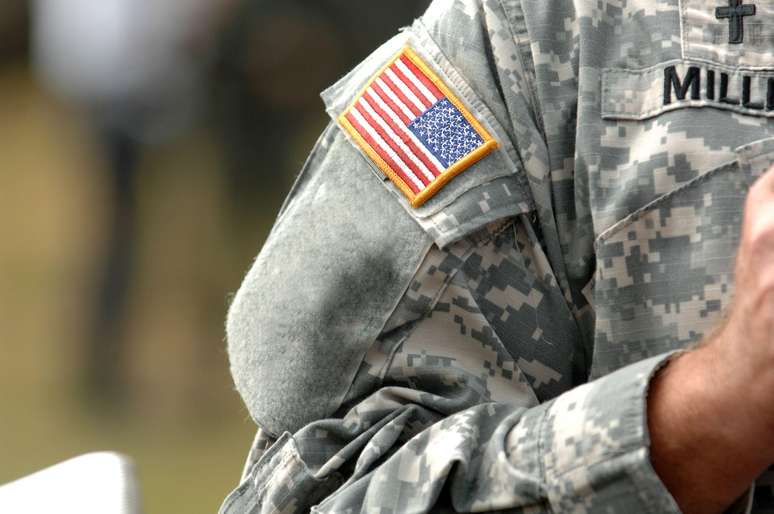
![Such a great sun in advance [SPOILERS] Such a great sun in advance [SPOILERS]](https://fr.web.img4.acsta.net/img/99/97/9997e78333cbdcb211d89de0cedb2d22.jpg)


